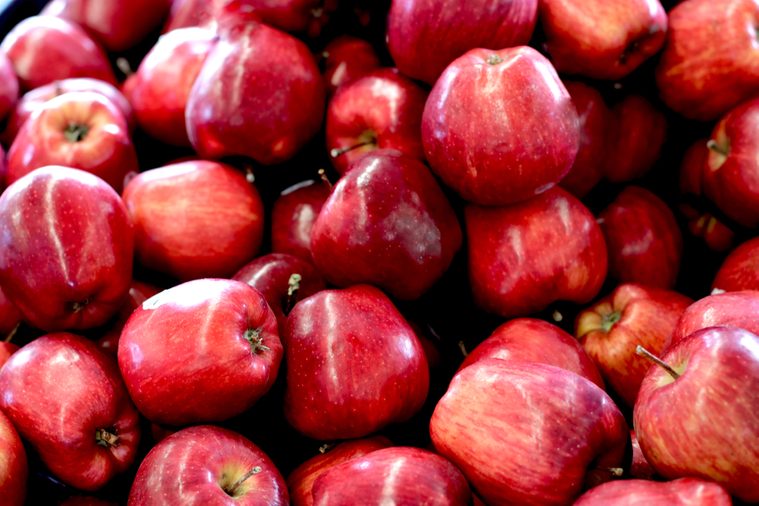
Talk it out
Knowing your family’s health history can help you get a head start on many diseases that can shorten your life; be sure to check on a history of heart disease, stroke, diabetes, or cancer. “Ask questions, talk at family gatherings, and look at death certificates and family medical records, if possible,” advises the Genetic Alliance. You can’t change your genes (yet), but if you know you are at a higher risk for heart disease, for example, there are many things you can do to lower that risk, such as exercising, eating a healthy diet, and maintaining a normal weight.

Stay slim and trim
For people who fall into the overweight or obese category, every two pounds they gain shaves two months off their life expectancy, according to a study published in Nature Communications. It’s not easy to lose weight and keep it off, but these 50 weight loss breakthroughs can help.

Enjoy a cup of joe… or 8!
It may be time to reload your Starbucks card: Drinking coffee (even as much as eight cups a day!)—decreases your risk of dying from all causes, according to a study in JAMA Internal Medicine. However, if you get headaches, an irregular heartbeat, or gastric upset from drinking coffee, just skip it. Learn more about the role coffee plays in weight loss and disease.
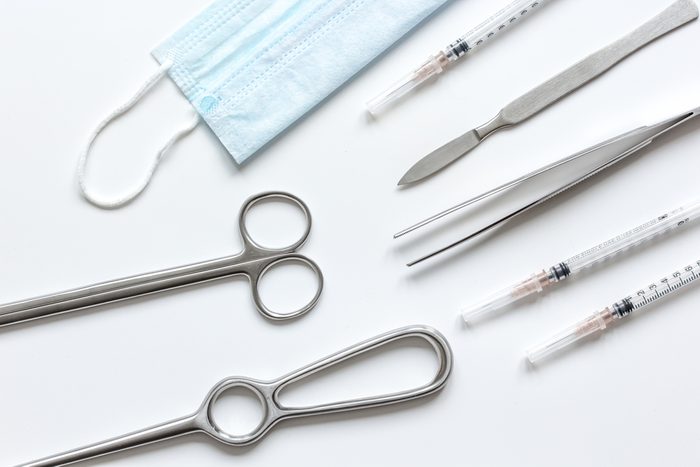
Look into weight loss surgery
Weight loss surgery does more than help you lose weight, it may also extend your life. Research from the University of Cincinnati and a research institute in Seattle shows that bariatric surgery improves life expectancy for most obese people when they’re compared to obese patients who do not have the surgery. Are you a candidate? Learn more about the risks and benefits of today’s top weight loss surgeries.
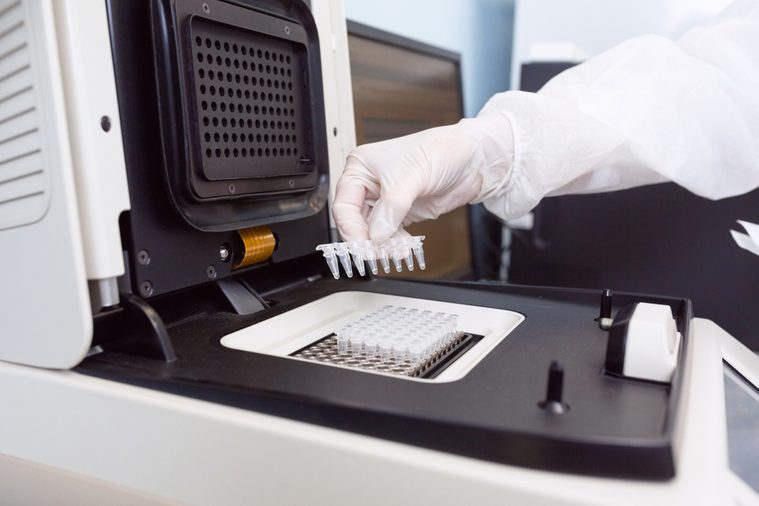
Stretch your telomeres
Telomeres are the protective caps on the ends of our chromosomes that dictate how long cells live. Short telomeres are linked to a host of age-related diseases and conditions, but a small study shows that positive changes in four key areas—your diet, exercise, stress management, and social support—may lengthen telomeres. “Our genes—and our telomeres—are not necessarily our fate,” says lead author Dean Ornish, MD, a UC San Francisco clinical professor of medicine, and founder and president of the Preventive Medicine Research Institute in a news release. “So often people think, ‘Oh, I have bad genes, there’s nothing I can do about it.’ But research indicates that telomeres may lengthen to the degree that people change how they live.” Learn more anti-aging secrets that could add years to your life.

Nail the longevity test
This doesn’t require a laboratory or white-coated examiners. This deceptively simple measure of flexibility and strength can predict if you will have a long life.
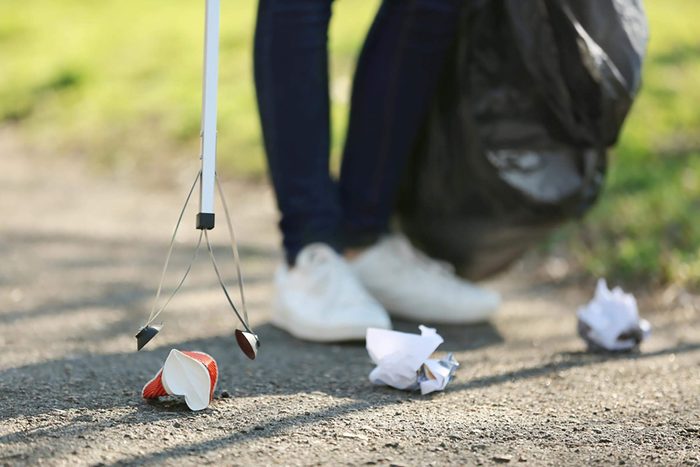
Find your calling
Whether it’s fighting to save abused animals or helping to ban plastic straws, if you can find a calling that gives you purpose, you’ll live longer. It’s possible that having a sense of purpose encourages you to take better care of yourself so that you can focus on changing your world. People with a higher sense of purpose were more likely to eat lots of vegetables, exercise, get good sleep, and even floss their teeth, according to a study in the Journal of Health Psychology. Read more about how living a purposeful life helps you age well.
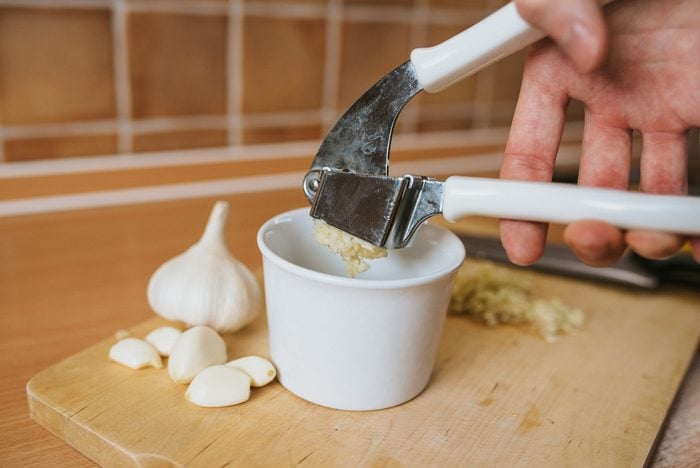
Invest in a garlic press
Garlic may help lower inflammation and cholesterol levels and that helps your heart stay healthy, according to a study in Clinical Nutrition ESPEN. The results were apparent in just six weeks. Garlic has many surprising benefits.
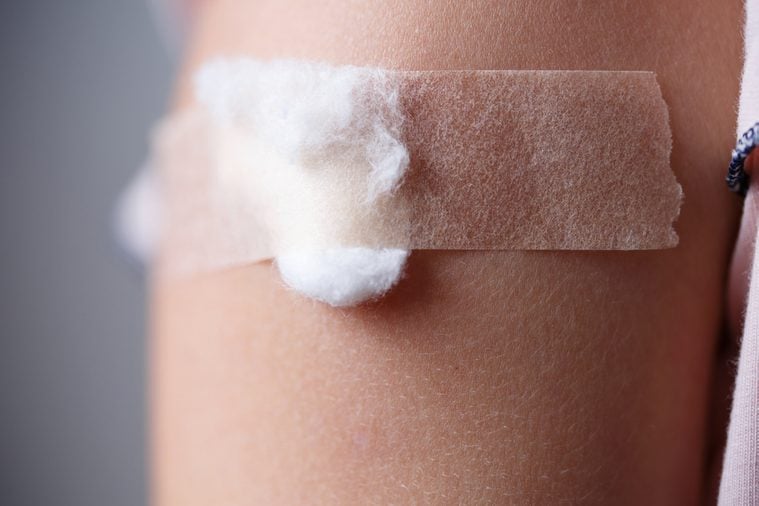
Give blood
It’s true. People who donate blood more frequently live longer than people who don’t donate, finds a study out of Denmark. Blood donors are known to be healthier in general, but the researchers still found an added benefit from the act of giving itself.
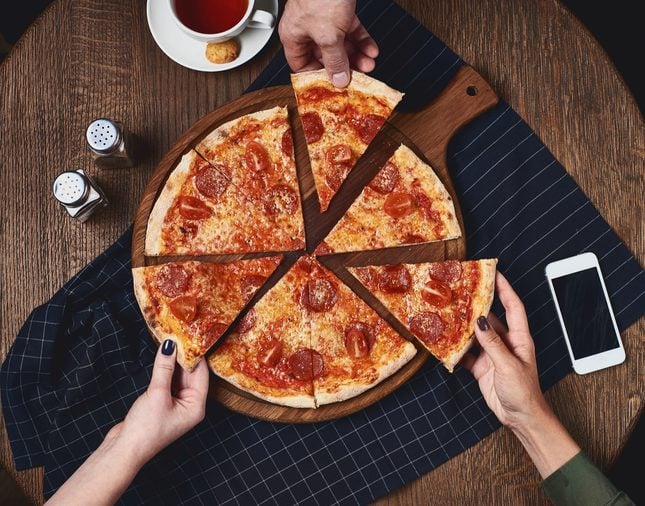
The skip-me five
Just avoiding the top five diet offenders—saturated fat, trans fats, added sugar, syrups, and refined carbs—can significantly lower your chances of disease and premature aging.
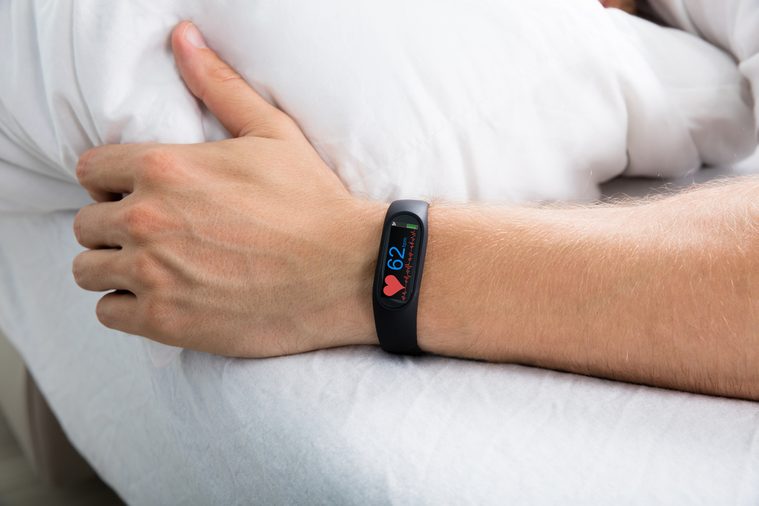
Know where you stand
Learn these six numbers: The calories you need in a day, your waist size, cholesterol levels, triglyceride levels, blood pressure, and morning pulse rate. Then figure out what’s healthy for you, and keep them in the proper ranges—you’ll tack years onto your life.

Do as they do
Don’t smoke, avoid red meat, and follow these eight other secrets of “super agers” to live a longer, healthier life. We can all pick up a healthy habit or two from people who are aging so well that they have cognitive abilities on par with people decades younger than them.
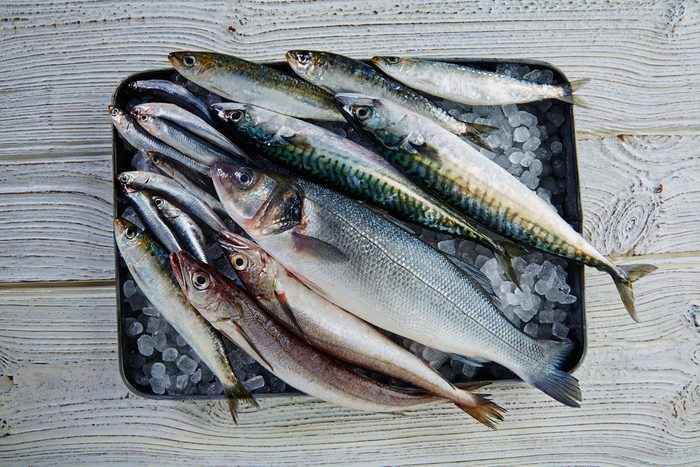
Go fish
Inflammation is the smoking gun responsible for many diseases including heart disease, stroke, high blood pressure, cancer, and even Alzheimer’s disease. “We should eat foods that have anti-inflammatory benefits, such as foods rich in omega-3 fatty acids,” shares Earl Mindell RPh, PhD, a Beverly Hills, Calif-based pharmacist, herbalist and author of several books including the New Vitamin Bible. Foods rich in omega 3’s include fatty fish such as cod, halibut, albacore tuna, and sardines. Hate fish? Check out these 7 fish-free ways to get more omega-3’s in your diet.
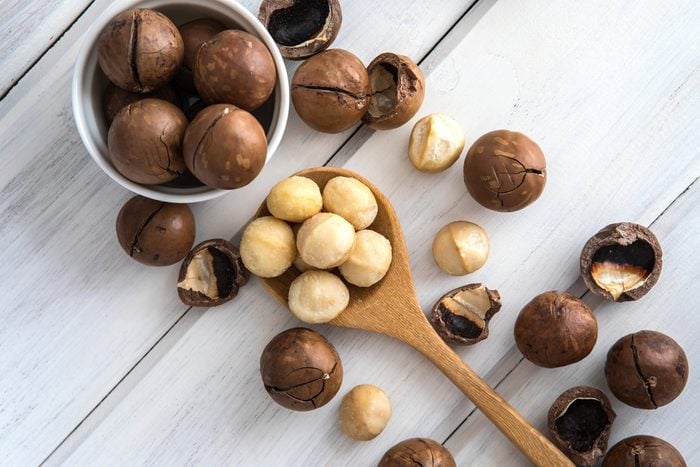
Eat more nuts
Eating nuts every day can lower your risk of dying from cancer, heart disease, and respiratory disease, according to a study in the New England Journal of Medicine. Nut eaters were 20 percent less likely to die during the course of the 30-year study than those who avoided nuts. What’s more, the study showed that nuts do not lead to weight gain as many have feared. Exactly how they can increase longevity is not 100 percent clear, but nut consumption has been linked to reductions in cholesterol levels and inflammation. These are the healthiest nuts that you can eat.

Spend time in the great outdoors
Joseph Campbell once said that “the goal of life is to make your heartbeat match the beat of the universe, to match your nature with Nature.” Campbell is on to something. “Nature is timeless, boundless, intelligent, and perfectly imperfect,” shares Las Vegas-based life coach and author Christy Whitman.” Put your bare feet in the grass or in a body of water and experience nature.”

Say “om”
Meditating even for just a few minutes each day can dramatically improve your outlook, emotions, and health, Whitman says. “Contrary to popular belief, meditation requires no special training. Simply allowing your attention to become engaged on a soothing sound or image will quiet your mind and provide a much-needed reprieve from the constant stream of thoughts,” she says. Never meditated before? Try starting your morning with these mindfulness exercises.
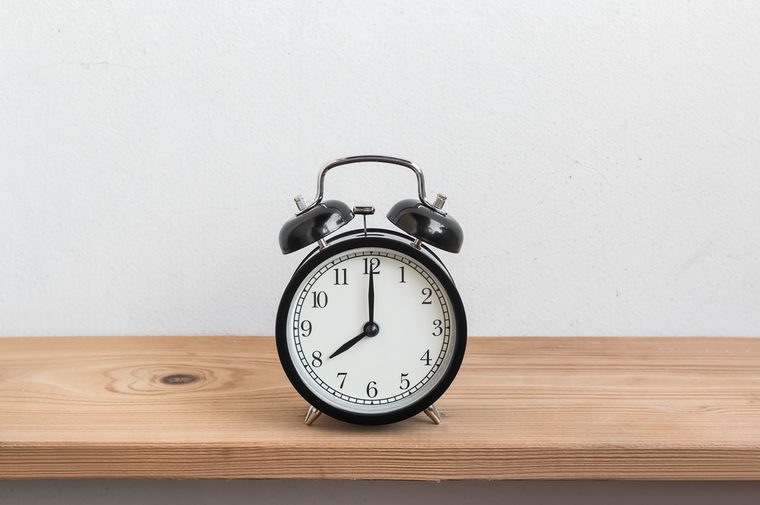
Give intermittent fasting a try
Intermittent fasting is all the rage, and it may have substantial benefits on longevity. The idea is that you eat during a set window of time—usually eight hours, so between, say, 10 a.m. and 6 p.m.—and you stay out of the kitchen the rest of the day and night. The latest study on this emerging trend showed that increasing the time off from eating improved the health of male mice and lengthened their lives, compared to mice that ate more frequently. What’s more, the health benefits occurred regardless of what the mice ate or how many calories they consumed. “This study showed that mice who ate one meal per day, and thus had the longest fasting period, seemed to have a longer lifespan and better outcomes for common age-related liver disease and metabolic disorders,” says NIA Director Richard J. Hodes, MD, in a news release.” Find out more about the anti-aging benefits of intermittent fasting.

Make mine a mocktail
For decades, we were told that moderate alcohol consumption can be heart healthy, but now a new study in The Lancet warns that there is no such thing as safe or healthy alcohol consumption and that alcohol is associated with nearly one in ten deaths among middle-aged people. Here are 17 tips to help you drink a little bit less.
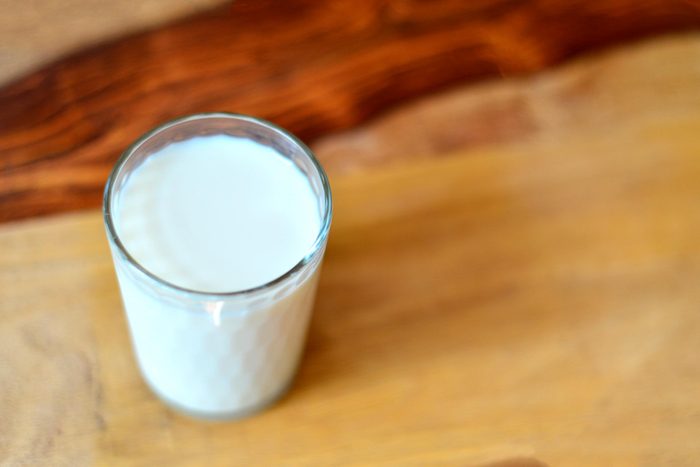
Triple down on dairy
Adding more dairy to an already healthful diet may reduce your risk for diseases that can shorten your life including heart disease and diabetes. “Our study shows adults need three servings of dairy a day as part of a healthy eating pattern to help meet their nutrient needs, especially for calcium, vitamin D, and potassium, says study author Julie Hess, PhD, of the National Dairy Council in Rosemont, Ill. “While we can’t fully explain the link between dairy foods and a reduced risk of certain chronic diseases reported in some studies, we do know milk, cheese and yogurt have a unique nutrient composition that may contribute.” Here are more persuasive reasons to eat dairy today.

Cook at home
Cooking at home is known to be healthier than ordering in or going to a restaurant. In one study, individuals who had at least five home-cooked meals per week were 28 percent less likely to be overweight and 24 percent less likely to have excess body fat than individuals who ate less than three home-cooked meals per week. If you feel like you don’t have the time, Foodstirs Modern Baking makes it super easy to cook and bake healthful, organic foods without running all over town to gather the ingredients. Here are 45 other foods you have been buying that you should be making instead.

Catch your zzz’s
People who sleep less than five to six hours a night die sooner than their counterparts who rack in more hours of slumber, says Los Angeles sleep expert Michael J. Breus, PhD, author of several books on sleep including The Sleep Doctor’s Diet Plan: Lose Weight Through Better Sleep. No one’s exactly sure how more sleep adds years, but Breus has a theory: “Our bodies were not designed to be awake that long and they wear out,” he says. Stress probably plays a role too. “People who burn the candle at both ends are high in stress and that will certainly have an effect on health.” Here are 9 myths about sleep you should stop believing if you want a good night’s rest.

Quit smoking
The single most important thing anyone can do for their health is to avoid tobacco or quit smoking if they already use it, urges Maher Karam-Hage, MD, professor of Behavioral Science and medical director of the Tobacco Treatment Program, The University of Texas MD Anderson Cancer Center in Houston. “The average smoker loses between 10 and 15 years of life, but quitting smoking can help you return to normal health within a few years and avoid significant impacts on life expectancy,” he says. “The earlier the better, but even those who quit in old age can still see benefits.” Try one of these 20-plus ways to stop smoking and start your path towards a healthier, smoke-free life.

Schedule your colonoscopy
Colon cancer rates are on the rise in people under 50, and now new guidelines from the American Cancer Society recommend that people at average risk for colorectal cancer start regular screening at age 45 (instead of 50). This may catch even more colon cancers in their early curable stages. The prep is no fun, but a colonoscopy may just save your life. Schedule yours ASAP.

Practice sun safety
Melanoma, the potentially fatal form of skin cancer, is almost entirely preventable. “Avoid spending too much time in the sun, especially between 10 a.m. and 4 p.m., and seek out shade while outdoors,” advises Susan Chon, MD, associate professor of Dermatology, The University of Texas MD Anderson Cancer Center in Houston. “You should also wear tightly woven clothing with a UPF rating of 50, and can add a wide-brimmed hat and protective sunglasses for even more protection. Finally, apply a wide-spectrum physical sunscreen of SPF30, with zinc oxide if possible, 30 minutes before UV exposure.”

Don’t vape
Proponents contend that e-cigarettes are less harmful than regular cigarettes—but the experts say don’t be so sure. The latest research shows that adolescent users get just as much nicotine with e-cigs as they do with traditional ones. And another new study found that vaping may modify the DNA in the mouths of users, which could increase their cancer risk. These findings were presented at the 256th National Meeting & Exposition of the American Chemical Society (ACS) in Boston. “E-cigarettes are a popular trend, but the long-term health effects are unknown,” says study author Romel Dator, PhD, a postdoctoral associate at the University of Minnesota Masonic Cancer Center in St. Paul, in a news release.
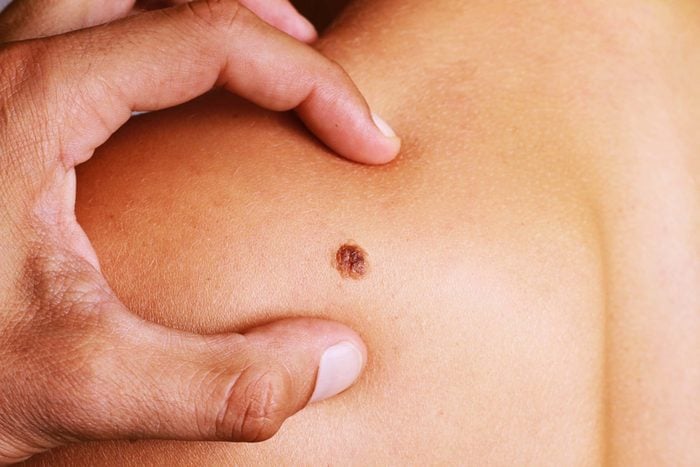
Know your skin
While there’s no substitute for prevention, catching skin cancer early—when it is in its most treatable forms—is the next best thing. “Be on the lookout for any suspicious or changing moles or lesions,” Dr. Chon says. “If you have something that you’re worried about, get it checked out by a dermatologist.” Here are 7 skin cancer symptoms you should check for right now.
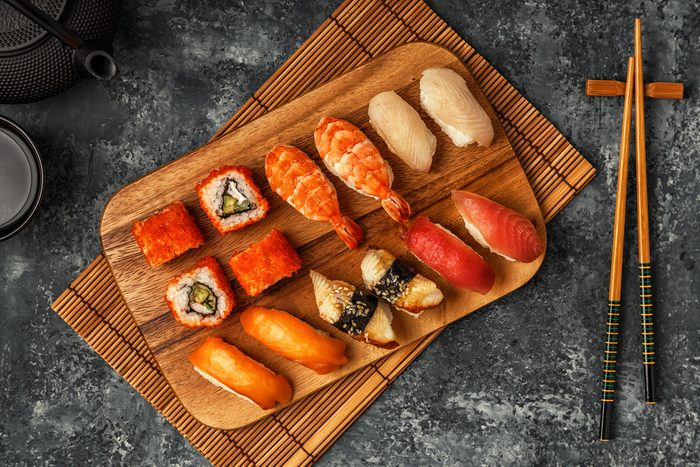
Order sushi with brown rice
Switching a little more than two servings of white rice to brown rice will lower your risk of developing type 2 diabetes by 16 percent, according to a study. The fiber in brown rice can also help reduce LDL—”bad”—cholesterol and increase feelings of satiety, which can make it easier to maintain a healthy weight. Many Japanese restaurants will even make rolls with brown rice if you ask. Here are 30 ways to get more fiber in your diet without even trying.

Get the HPV shot
Cervical cancer is a completely preventable disease thanks to screening and the human papillomavirus (HPV) vaccine, stresses Kathleen Schmeler, MD, associate professor of Gynecologic Oncology and Reproductive Medicine, The University of Texas MD Anderson Cancer Center in Houston. “The vaccine is recommended for all boys and girls, ideally at the ages of 11 or 12, and is a safe and effective cancer prevention vaccine.”
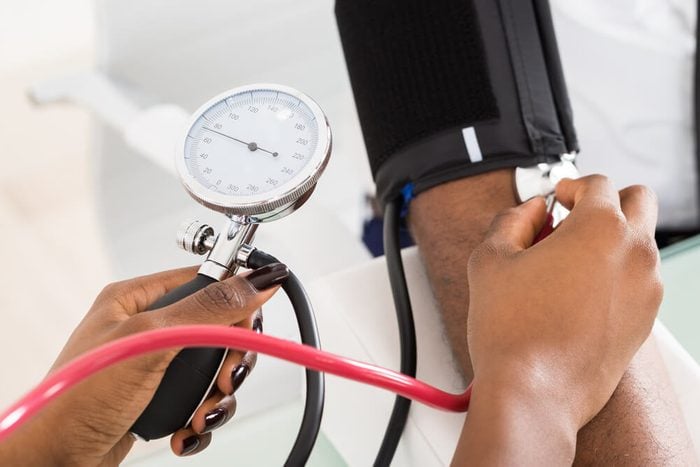
Keep your BP down
The difference between having an ideal blood pressure (115/76) and high blood pressure (over 140/90) can make a “RealAge difference of more than 20 years,” says Michael Roizen, MD, Cleveland Clinic’s chief wellness officer and author of several books, including Real Age: Are You as Young as You Can Be? Put another way, maintaining a normal blood pressure will add years to your life. Here are 8 foods to watch out for if you have high blood pressure.
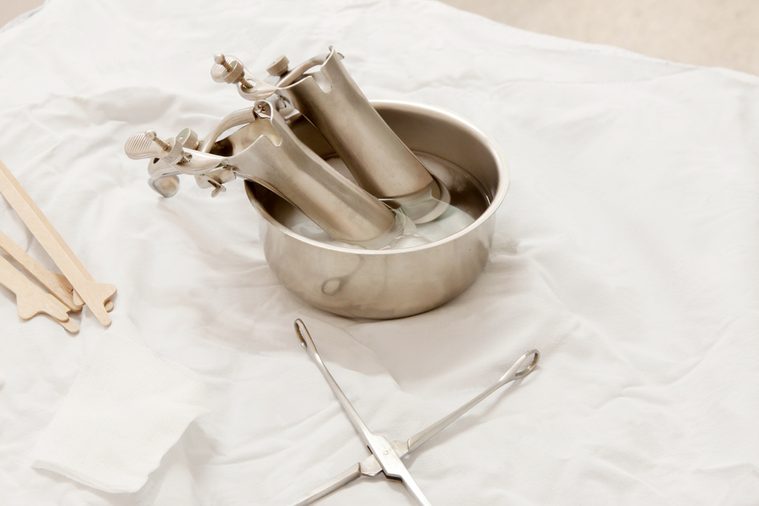
Get screened for cervical cancer
All women between the ages of 21 and 65 should undergo cervical cancer screening unless they have had a hysterectomy for non-cancerous reasons, says Dr. Schmeler. “The screening guidelines can be confusing, so ask your doctor or look them up,” she says. “If you have an abnormal Pap or HPV test, it is important to follow up and get any recommended further testing and treatment in order to prevent cancer.”

Talk to your doctor about prostate cancer screening
Prostate cancer is the most common form of cancer in men and the third leading cause of cancer death for men, the National Cancer Institute (NCI) states. Men should discuss whether, when, and how they should be screened for this cancer with their doctor. Screening involves a physical exam including a digital rectal exam and a blood test to check the PSA levels. Here are 8 prostate cancer facts that all men should know.

Be first in line for your yearly flu jab
As many as 646,000 people worldwide die from seasonal flu-related respiratory illnesses each year, higher than a previous estimate, according to the latest numbers from the Centers for Disease Control and Prevention (CDC). “[Getting the flu shot] is especially important for those who have a chronic disease with a weakened immune system, as it may be harder for them to fight off infections, as well as those who are consistently around a lot of people in their day-to-day lives (e.g. teachers or health care providers), as their likelihood of being around the flu and contracting the flu is greater,” says Mia Finkelston, MD a family physician in Leonardtown, MD, who treats patients via telehealth app LiveHealth Online. The CDC recommends that people get a flu vaccine by the end of October, but it’s never too late.

Stand your ground
Don’t back down, research shows that a stubborn disposition may give you an important edge—a longer life. The study authors believe that stubborn peeps are less likely to care about what others think of them and, in turn, may have less external stress about it. Looking to live a more stress-free, happy life yourself? These tips for being happier without really trying may help.

Listen to this podcast
Bulletproof Coffee founder Dave Asprey plans to live to 180, and his podcast, Bulletproof Radio, features “biohackers” who share tips on how they plan to double their lifespan. (Biohacking refers to “hacking” your body’s biology through lifestyle changes so you can feel your best and live past 100.)
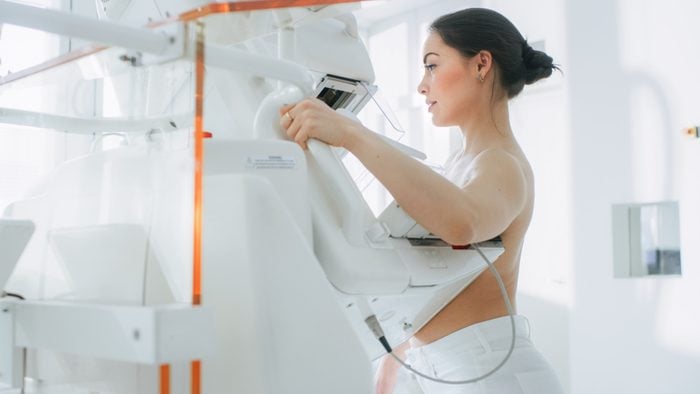
Don’t skip your yearly mammogram
Screening mammograms or breast x-rays are a woman’s best defense against breast cancer, says Therese Bevers, MD, professor of Clinical Cancer prevention and medical director of the Cancer Prevention Center, The University of Texas MD Anderson Cancer Center in Houston. “Screening mammograms find breast cancers at an earlier stage, reducing a woman’s chance of dying from the disease.” Make sure you get yours, and if your mammogram is abnormal, ask these 7 important questions.

Don’t sweat the small stuff
Selma Cohen of Ardsley, New York just recently turned 100, and while she isn’t sure she has all of the answers, she does believe that staying positive and not dwelling on petty matters has helped her reach this milestone.

Stay engaged
Cohen is a former concert pianist and continues to play as often as possible. She also takes continuing education classes on a host of topics to keep her mind sharp. “This keeps me feeling young and relevant,” she says. There are classes for seniors available in most communities.

Check your breasts
“Some warning signs of breast cancer can include a new lump or mass, dimpling of the breast or nipple, swelling or redness, scaliness or an ulcer on the nipple, spontaneous discharge, and a lump in the underarm,” says Dr. Bevers. “Many of these changes are not cancer, but it’s important to have them checked out by a healthcare professional.” Here’s how to do a proper breast self-exam courtesy of breastcancer.org.

Get dirty
Some experts believe we’re too clean and, as a result, our immune systems don’t get enough practice fighting off bugs. Early childhood is when we should be exposed to germs that will educate our immune system. When this doesn’t occur, the immune system doesn’t learn to recognize friend from foe and then tends to overreact to perceived threats, upping our risk for many ailments, from allergies to depression. Here are ways to boost your immune system.
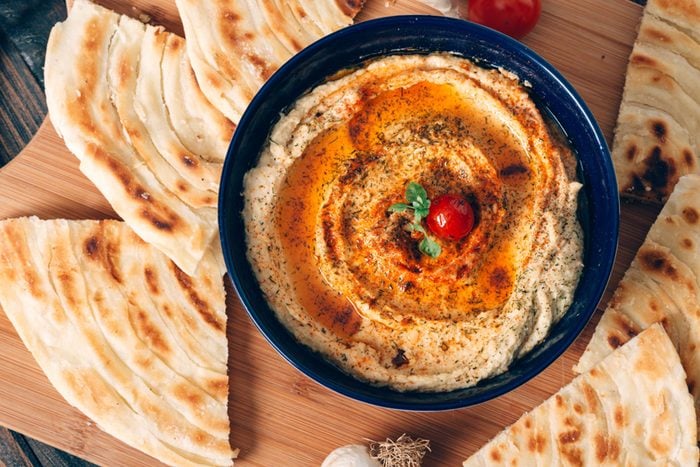
Eat like a Greek
A robust body of literature suggests that eating a Mediterranean-style diet which is rich in fresh veggies, whole grains, and lean protein leads to longer, healthier lives. The latest study that those who ate the most like Mediterraneans were significantly less likely to die from any cause than their peers who did not. Check out this cheat sheet to learn more about the Mediterranean diet.

Look to a higher power
People who attend religious services at least once a week tend to outlive those who go less often, a study suggests. Social support and a more optimistic outlook may help explain the benefit to worship.

Reach out and touch someone
Feeling lonely may be as deadly as smoking 15 cigarettes per day, says Doug Nemecek, MD, Chief Medical Officer for Behavioral Health at Cigna. “Studies continue to show the profound and damaging effects it can have on both mind and body.” Combat loneliness by calling a friend or family member to say hi or schedule a lunch or visit. Check out more tips on how not to feel lonesome.
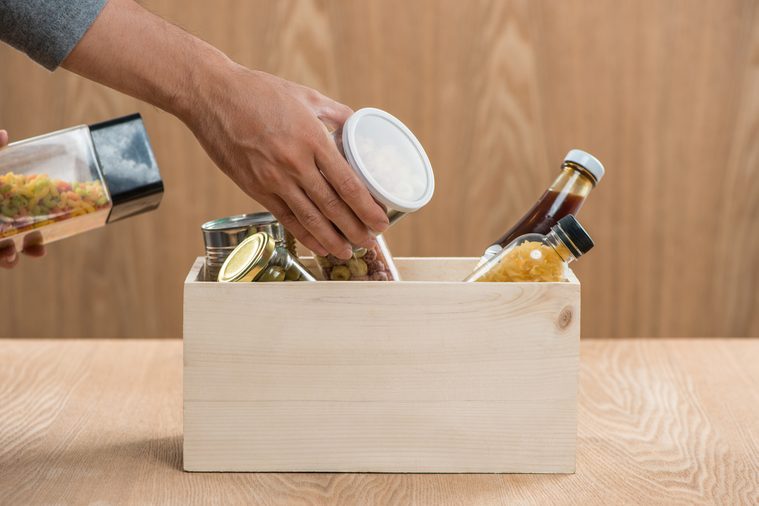
Give back for the right reasons
Volunteers who lend a hand for selfless reasons live longer than those who don’t volunteer, a new study shows, but volunteering because you have to or for more self-centered reasons won’t provide the same perks, according to a study in Health Psychology.

Protect your noggin
Wearing a properly fitted helmet when riding a bicycle or motorcycle can save your life. In one study of more than 64,000 cyclists, helmets reduced the risks of a serious head injury by nearly 70 percent. Make sure you wear the right helmet for the right activity by following these tips from the Consumer Product Safety Commission.

Start a gratitude journal
Grateful people feel healthier and report fewer aches and pains, according to a study in Personality and Individual Differences. Start a journal and write down all of the things you are grateful for a few times a week—you won’t believe how quickly your outlook will improve. This is what a gratitude journal really looks like.

Take a deep dive into your DNA
Wondering why low-carb dieting isn’t working for you? The answer may be in your genes. “Understanding your genetics in combination with blood markers can give you the tools to live not only longer but healthier,” says Jennifer Lovejoy, PhD, Chief Translational Science Officer at Arivale, a Seattle-based scientific wellness company. For example, if you have an increased risk of heart disease and stroke because of a gene that impacts your ability to process B vitamins—and your cholesterol is high—you can take steps to lead a heart-healthy lifestyle, potentially preventing early death from a heart attack. “If you have a genetic variant that impairs absorption of vitamin D, combined with low blood levels of this key vitamin, you can proactively take a higher-dose supplement to potentially avoid suffering from osteoporosis as you age,” says Lovejoy. Arivale’s platform offers genetic analysis plus personal coaching to help understand and capitalize on all this info.

Make healthy the default
New transparent refrigerators will display (and correctly store) fresh foods so they are more enticing, not to mention easier to grab. Until then, make sure healthy choices—fruits, low-fat dairy products, and cut veggies—are easier to reach and more visible than the less healthy processed foods. Learn more about what being healthy will look like in 2020.

Make sure your CO detector is up to snuff
Carbon monoxide (CO) is an odorless, colorless gas that occurs when fuels burn incompletely. It’s called the invisible killer, but the advent of CO alarms has saved countless lives. Is yours in working order? The National Fire Protection Association recommends testing these life-saving alarms at least once a month. Here are some other tips to keep your home safe from CO poisoning.

Tune into the Dr. Oz show daily
While the good doctor occasionally overstates the benefits of some of the healthy behaviors and supplements, for the most part, he’s pushing a healthy lifestyle. Alternatively, you could check out Dr. Oz’s tips to prevent cancer.

Go green
Breast cancer risk is lower in women who live closer to urban green spaces, like parks or gardens, according to a study in the International Journal of Hygiene and Environmental Health. “We found a reduced risk of breast cancer among women living…closer to urban green spaces. By contrast, women living closer to agricultural areas, had a risk higher,” says study author ISGlobal researcher Cristina O’Callaghan-Gordo, PhD, an assistant research professor at the Barcelona Institute for Global Health. “The findings suggest that the association between green space and a risk of breast cancer is dependent on the land use.”
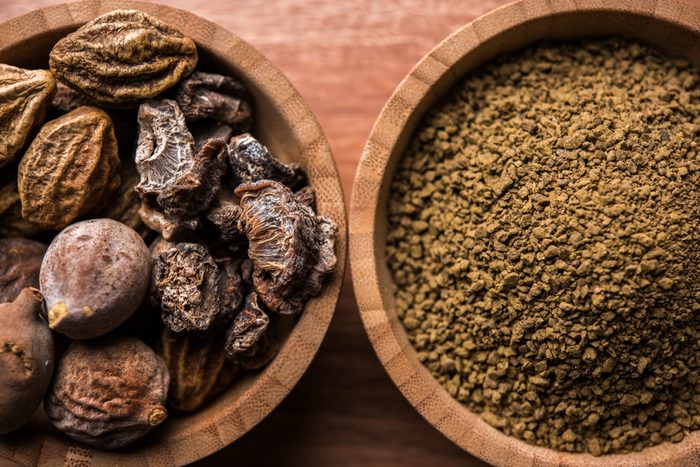
Be pro probiotics
The bacteria living in our gut may influence how well we age. When scientists fed fruit flies a combination of probiotics and an herbal supplement called Triphala in a study, they prolonged the flies’ longevity by 60 percent and protected them against chronic diseases. “The effects in humans would likely not be as dramatic, but our results definitely suggest that a diet specifically incorporating Triphala along with these probiotics will promote a long and healthy life,” says study author Satya Prakash, professor of biomedical engineering at McGill University in Montreal, Quebec.

Follow blue clues
Individuals who live in five so-called Blue Zones—Sardinia, Italy; Okinawa, Japan; Loma Linda, California; Ikaria, Greece; Nicoya, Costa Rica—live longer and healthier than people living anywhere else. Blue Zone residents tend to have nine things in common, starting with the fact that they move more in their day-to-day lives. They tend not to overeat (they stop when their stomach is 80 percent full, researchers have found). They also are more likely to have a sense of purpose. Check out the rules we’ve learned from people living in these Blue Zones.
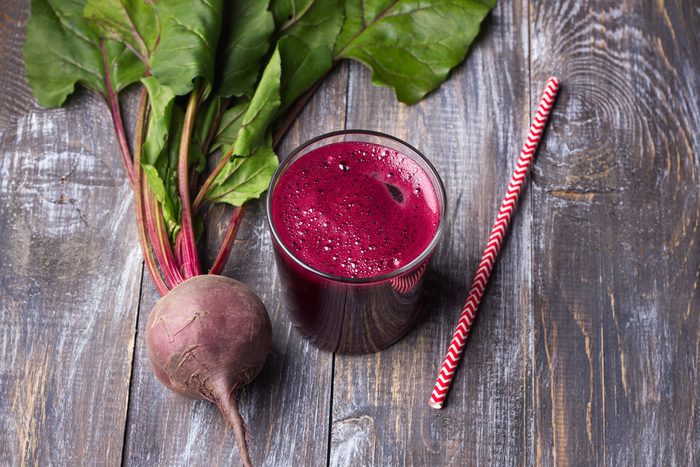
Beet it
The healthful compounds found in beet juice may lower blood pressure. High blood pressure is a major risk factor for heart disease, the leading cause of death in the United States. In one study, people with high blood pressure who drank about eight ounces of beetroot juice had a drop in blood pressure of about 10 millimeters per mercury (mmHg). “Our hope is that increasing one’s intake of vegetables with a high dietary nitrate content, such as green leafy vegetables or beetroot, might be a lifestyle approach that one could easily employ to improve cardiovascular health,” says Amrita Ahluwalia, PhD, lead author of the study and a professor of vascular pharmacology at The Barts and The London Medical School in London, in a news release. The beetroot juice contained about 0.2g of dietary nitrate, which is similar to what is seen in a large bowl of lettuce or two beetroots, the study authors point out. As far as a possible mechanism, nitrate is converted to a nitrite and then to nitric oxide in the blood, and nitric oxide widens blood vessels and aids blood flow.

Spice it up
Eating spicy chili peppers may add years to your life, according to a study in PLOS One. Chili pepper eaters had a 13 percent lower risk of a premature death than people who did not eat peppers. While the study can’t say for certain that peppers are the reason these individuals lived longer, peppers do have a surprising number of health benefits. They may lower blood sugar or glucose levels and cool systemic inflammation, among other benefits.

Clear the air
From weakening bones and harming kidneys to damaging the heart and lungs, air pollution—namely ozone and tiny particles—is doing more damage than anyone previously thought. The EPA tracks air quality so you can stay informed. Also, take precautions to keep your indoor air clean by following these tips.

C’mon get happy
If you’re a glass-half-full sort of person, you may live longer than your pessimistic cronies. A recent study from Harvard found that people who scored highest on measures of optimism had a 16 percent lower risk of death from cancer, a 38 percent lower risk of death from heart disease and respiratory disease, and a 39 percent lower risk of dying from stroke. The researchers believe that having a positive outlook makes you more likely to engage in healthy behaviors like exercising and eating right.

Be OK with being… OK
The desire to be perfect and keep up with the Joneses can be toxic. “Perfectionism plagues the brain with negative thoughts, which cause a release of stress hormones and that can actually accelerate aging,” psychotherapist Mike Dow, PsyD, PhD, author of Chicken Soup for the Soul: Think, Act & Be Happy told Reader’s Digest. “While it’s fantastic to want to do your best, it’s also OK to have a B-plus dinner party or to take a day off to relax and do nothing.” Find out more about how negative thinking can age you faster.

Get hitched
Married people may live longer than non-married folk, according to a study from Duke University in Durham, North Carolina. People who never married were more than twice as likely to die early than those who had been in a stable marriage throughout their adult life, the study showed. The so-called “marriage protection hypothesis” suggests that you are more likely to take better care of yourself when you have someone else who counts on you and reminds you about important health screening tests or wearing a seat belt. The emotional and social support in a marriage can also help buffer you from the negative effects of stress. Here are more little-known ways marriage affects your health.

Keep your eyes on the prize
Treating vision problems may extend your life. This is the main message of research published in JAMA Ophthalmology. Women in the study who underwent surgery to correct cataracts were less likely to die from any cause than were women who did not undergo the vision-sparing procedure, possibly due to improved health status and independence that sight enables. Cataracts or a clouding of the eye’s lens are the leading cause of blindness in those over the age of 40, according to the CDC.

Babysit your grandkids
Babysitting for your grandkids does more than keep you on your feet and connected to loved ones, it may just save your life, a study out of Australia shows. Seniors who sometimes watched their grandchildren were more likely to be alive ten years after the start of the study; half of the participants who didn’t help out had passed away within five years of the study’s start. Here are more reasons being a grandparent is good for your health.

Go dark
Chocoholics rejoice! Dark chocolate—with a minimum of 70 percent cacao—can lower stress and inflammation and improve mood, memory, and immunity, according to two new studies presented at the Experimental Biology 2018 annual meeting in San Diego. “These studies show us that the higher the concentration of cacao, the more positive the impact on cognition, memory, mood, immunity and other beneficial effects,” says study author Lee S. Berk, DrPH, associate dean of research affairs at the School of Allied Health Professions and a researcher in psychoneuroimmunology and food science from Loma Linda University in Loma Linda, California., in a news release. This is what happens to your body when you eat chocolate.
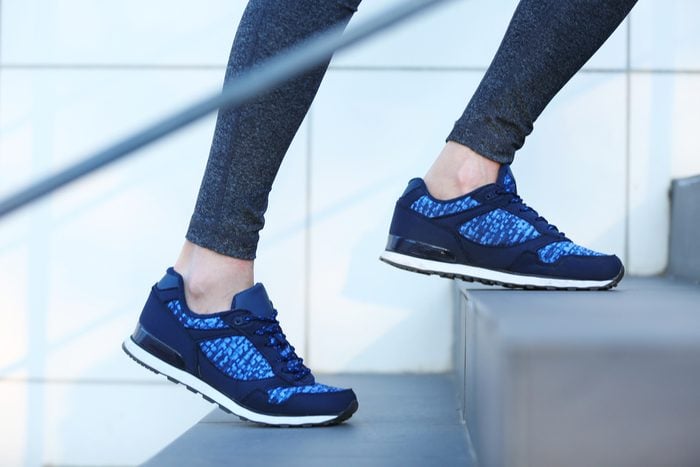
Keep on moving
Researchers from the University of California San Diego School of Medicine kept tabs on the activity levels of 6,000 women aged 65 to 99 for five years—the women wore a device that tracked their movements. The more active the women were, the longer they lived. Women who averaged just 30 minutes of light physical activity (dusting, washing dishes) each day dropped their risk of dying by 12 percent, according to research published in the Journal of the American Geriatrics Society. Those who got an hour of moderate activity (brisk walking, taking the stairs) lowered their mortality risk by 39 percent.
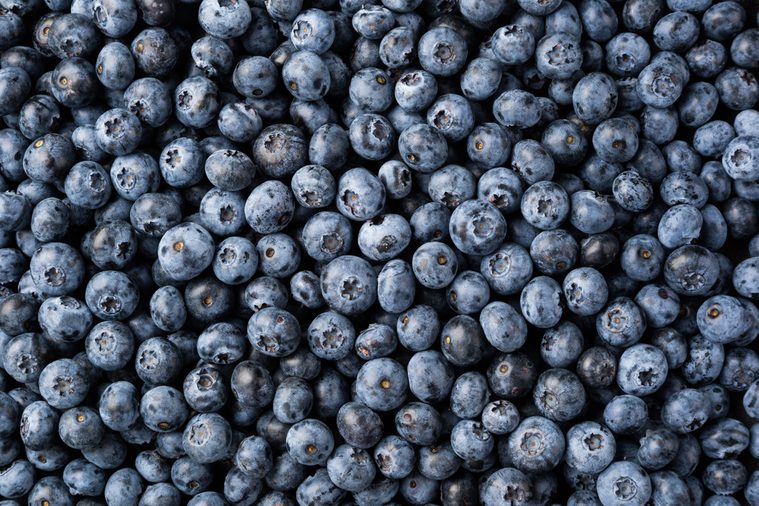
Go wild for blueberries
Sprinkling a handful of wild blueberries atop your yogurt parfait may do more than enhance the taste, it may also extend your life. Blueberries are loaded with antioxidants. In fact, one serving of wild blueberries has more “total antioxidant capacity” than one serving of cranberries, strawberries, plums or other fruits, according to the United States Department of Agriculture. Antioxidants sop up the damaging free radicals linked to aging, heart disease, and cancer. This is why blueberries make the list of the top 10 foods that can lower your risk for breast cancer.

Become a dog person
Dog owners live longer than non-dog owners. In one study, owners of dogs (especially hunting breeds) had a lower risk of death from heart disease or other causes. These protective benefits even held when people lived alone. Single dog owners were 33 percent less likely to die and 11 percent less likely to have a heart attack during the study period, compared to single non-owners. Dogs keep us moving with all of the daily walks and fetch sessions, and they also increase our social interaction, leading to longer and healthier lives. Looking for a four-legged friend? Visit your local shelter or find a specific breed rescue group such as the New Jersey Schnauzer Rescue Network to adopt your new BFF. There are groups for every breed.

Adopt a cat
Not a dog person? Don’t despair. Cat owners also live longer than their non-feline loving counterparts. Cat owners—both past and present—were less likely to die from heart disease or stroke than those who never owned a cat, according to a study in the Journal of Vascular Biology. “Acquisition of cats as domestic pets may represent a novel strategy for reducing the risk of cardiovascular diseases in high-risk individuals,” the study authors conclude.
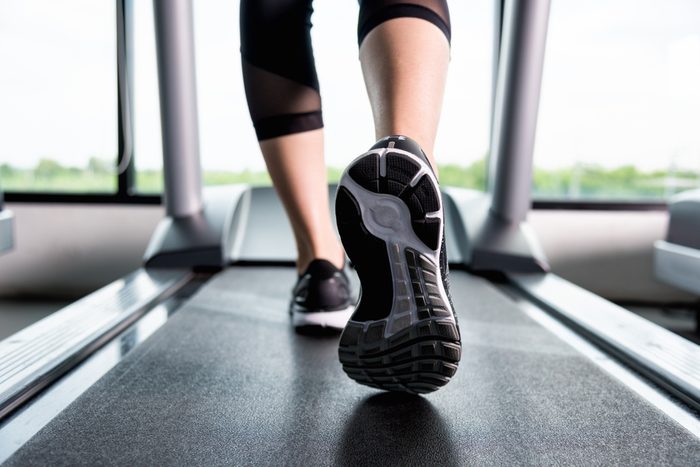
Sit less
The more you sit, the worse it is for your health. This has been shown time and time again in studies. In one report in the Annals of Internal Medicine, participants who sat for longer periods of time during the day had a higher risk of a premature death, even if they were active at other times during the day. Try and get up at least once every 30 minutes throughout the day to counteract the negative effects of all this sitting, whether by walking to the water cooler or stopping by a colleague’s office instead of emailing or calling.

Extend your vacay
Vacations are a great way to relieve stress and may add years to your life, according to a study presented at the European Society of Cardiology. In this ongoing study, when researchers did a 15-year follow up with men getting care for heart trouble. They found that guys who took less vacation time had a 37 percent greater chance of dying compared to men who took more than three weeks of vacation, annually. “In our study, men with shorter vacations worked more and slept less than those who took longer vacations. This stressful lifestyle may have overruled any benefit of [treatment],” says study author Timo Strandberg, MD, PhD, a professor of Geriatric Medicine at the University of Helsinki, Finland, in a news release.

Stand more
Three times as many office workers are using standing desks these days, according to a report from the Society for Human Resource Management. That’s huge: Among people using adjustable workstations that allowed them to shift between standing and sitting, 65 percent reported increased productivity, and 65 percent said that the standing desks positively impacted their health outside of the workplace. “This study found adjustable workstations beneficial in reducing sedentary behavior both in and outside of the workplace. In addition, these behavioral changes were sustained over time and were associated with more energy, less muscle pain, and more awareness of standing posture,” says Elizabeth Garland, MD, MS, associate professor in the Department of Environmental Medicine and Public Health at the Icahn School of Medicine at Mount Sinai in New York City, in a news release.
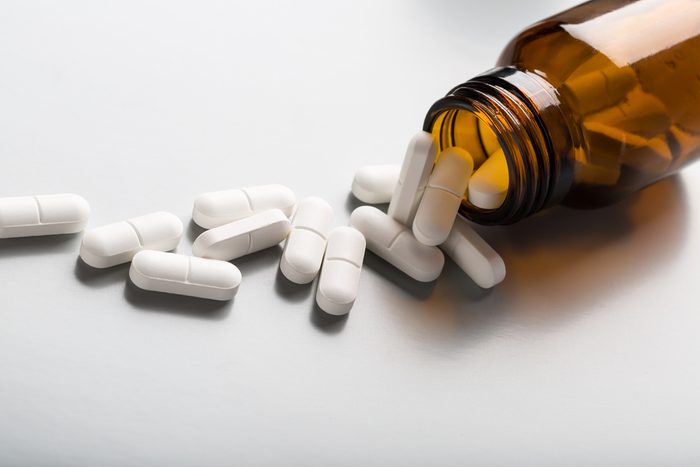
Get over antibiotics
Antibiotics can save your life, but overusing them can lead to resistance and the proliferation of deadly superbugs. Here’s when you really need antibiotics and when to skip them.
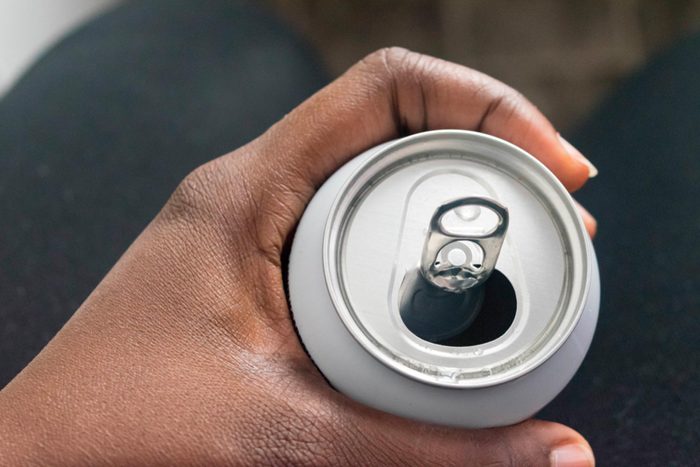
Break up with sugar
Your sweet tooth may be taking years off of your life, says plastic surgeon, Anthony Youn, MD, author of The Age Fix: A Leading Plastic Surgeon Reveals How to Really Look 10 Years Younger. “One study attributed 184,000 deaths each year to sugary drinks like soda pop and punch,” he says. “Not only do they increase your risk of diabetes and being overweight, but the sugar in the drinks also can make you look older.” You will be amazed at these 10 things that happen when you break up with sugar.
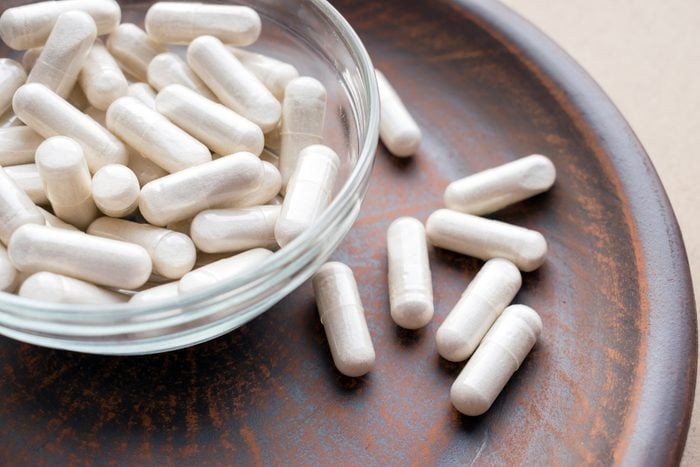
Check your B12
Vitamin B12 benefits your entire body, and there is evidence that it may help lower risk for heart disease. Are you getting enough? Check out these 11 signs that suggest you may need more B12 in your diet.

Order chicken instead of steak
Eating red meat increases the likelihood of dying from cancer, heart disease, respiratory disease, stroke, diabetes, infections, kidney disease, and liver disease. On the other hand, eating white meat like fish and chicken reduces the risk, a study in the BMJ suggests.
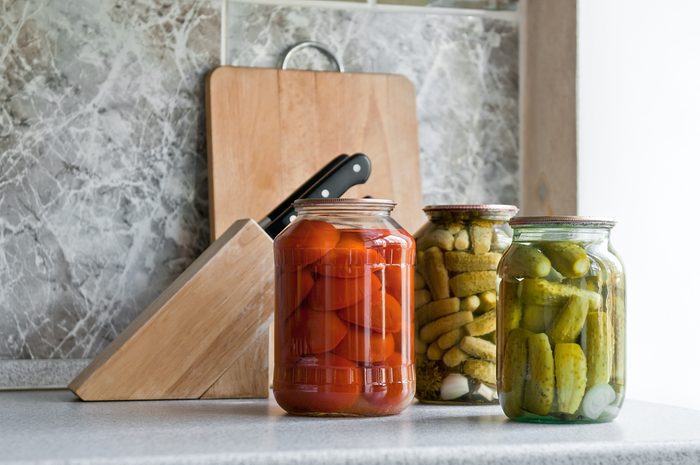
Be in a pickle
The fermentation process was created to preserve foods, but research now suggests that it may actually provide many health benefits. Pickles, sauerkraut, kimchi, kombucha, and other fermented foods are all rich in healthful probiotics that can help keep your gut in balance and stave off digestive woes, but that’s not all. Fermented foods may help lower your blood pressure, “bad” LDL cholesterol levels, and possibly help prevent cancer. This is why they made the list of foods that help unclog arteries.
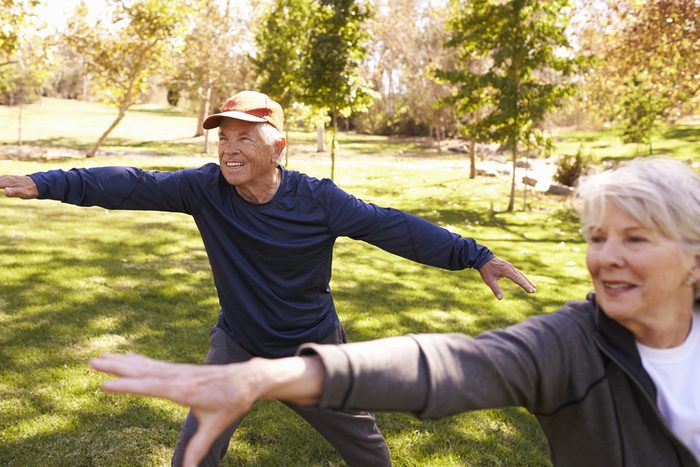
Don’t head for a fall
Elderly women who fall and break a hip are five times more likely to die within a year than women of the same age who don’t break a hip, according to a study from the Kaiser Permanente Center for Health Research. The key is preventing falls from happening, and new research shows that tai chi, (Tai ji quan) balance training classes are more effective at reducing falls in seniors than stretching exercises or a training program that combines aerobic, strength, balance, and flexibility exercises. Tai chi is a balance-training regimen specifically designed for older adults at risk of falling and people with balance disorders. Learn more about tai chi’s balance benefits.
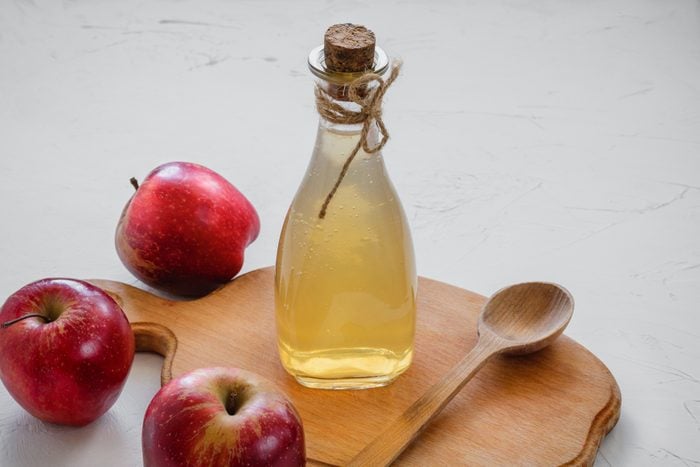
Dress your salad with apple cider vinegar
There is a growing list of health benefits linked to adding apple cider vinegar to your diet, including some hints that it may lower blood cholesterol levels and aid in weight loss efforts. Learn more about the ways that apple cider vinegar can improve your health to help you live to 100.
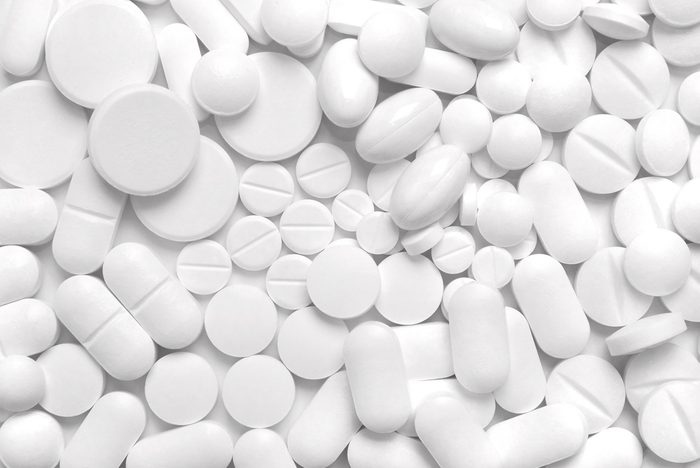
Bone up on calcium
Calcium is one of the main building blocks of healthy bones, and strong bones are less likely to grow brittle and break. Eating a diet rich in calcium or taking supplements helps bones stay strong. Are you getting enough? Here are 9 signs that you may not be getting enough calcium.

Tennis, anyone?
Playing tennis, doubles tennis, or another team sport may add years to your life, according to a new study of Danish men and women. Adults who reported frequently playing tennis lived 9.7 years longer than people who were sedentary, and they even lived longer than their jogging, swimming and cycling counterparts. “The leisure-time sports that inherently involve more social interaction were associated with the best longevity,” the study authors conclude.
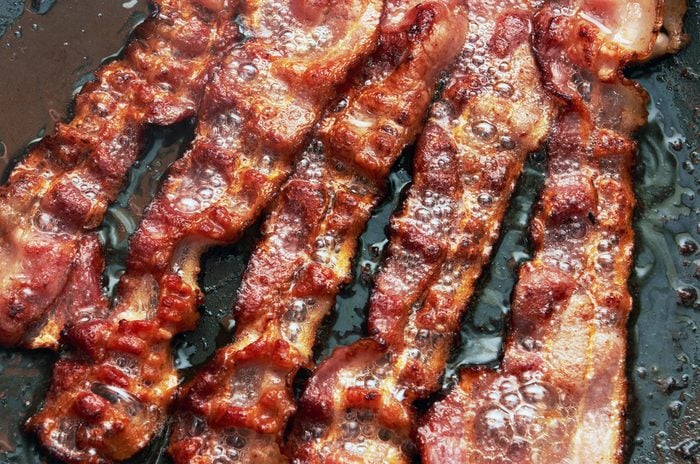
Ditch the side of bacon
Steer clear of processed meats. The World Health Organization (WHO) classifies deli meats, hot dogs, ham, bacon, and sausage as carcinogens. This is why processed meats rank high on the list of foods that cancer docs never, ever eat.
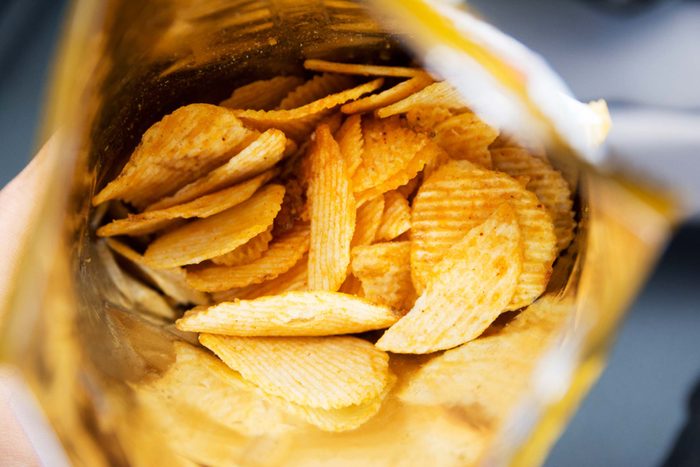
Just say no to “ultra-processed” foods
People who eat ultra-processed foods—things like American cheese, cured meats, packaged snacks, and boxed meals—have a higher risk of cancer, according to a study in The BMJ. Exactly how much higher? Eating just 10 percent more ultra-processed foods equaled more than a 10 percent increase in risks of overall cancer and breast cancer, the study showed. The findings are a reminder to eat more “minimally processed foods,” as the study authors say: Aim for fewer or single ingredient foods like fresh produce, rice, meat, and eggs. The study even found that some processed foods like canned vegetables with added salt and canned fruits with added sugar were fine.
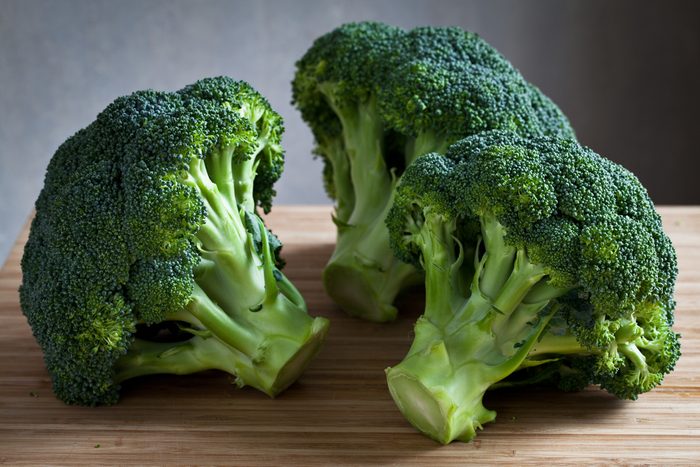
Load up on fruits and veggies
Apples, blueberries, broccoli, spinach…whatever your favorites are, just make sure you eat them every day. P.S: This is exactly how many fruits and veggies you need to eat to help you live longer.

Say yes to sex
Having sex at least once a week may help you live longer, a new study suggests. Researchers at the University of California in San Francisco tracked the sex lives of 129 mothers in relationships for one week. The participants provided a daily report of their overall relationship satisfaction including intimacy with their partners. When researchers compared the women’s reports to their blood samples, they found that moms who had sex at least once during that week had significantly longer telomeres than those who did not. Telomeres are the protective cap on DNA strands. Telomere length is known to shorten with advancing age, but lifestyle changes such as having sex regularly may stabilize or increase telomere length and help prevent aging. That makes sense, given the incredible health benefits you get from sex.

Let the carbs shine in
People who eat a moderate amount of carbs—about 50 percent of their daily calories—may actually live longer than those whose diet is loaded with carbs and those who restrict carbs, according to recent research published by the Lancet Public Health. Specifically, people who ate a moderate amount of carbs at age 50 were estimated to live until they were 83; the high-carb eaters had a life expectancy of 79, the low-carb group, about 82. These are the 9 times you should never, ever eat carbs.
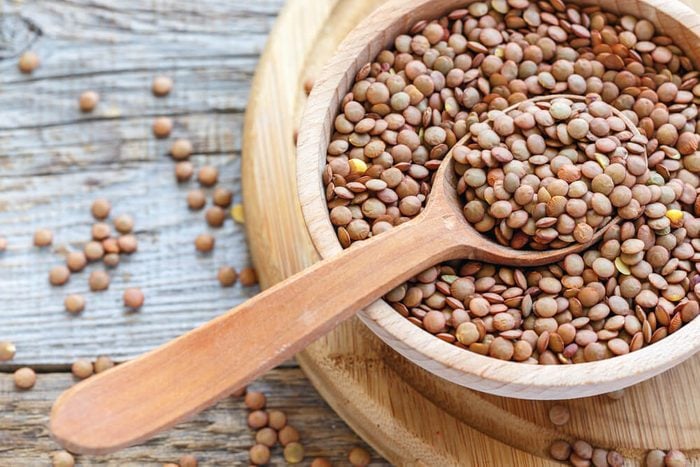
Choose lentil loaf over meatloaf
The more plant protein and the less animal protein you eat, the lower your risk for heart disease, which is the number one cause of death in the United States. In a study of nearly 6,000 people from the Netherlands, those who ate more plant protein and less animal protein showed a lower risk of developing coronary heart disease during the 13-year follow-up. Here are the top 10 sources of plant protein, ranked.
Eat an apple a day
We’re not kidding. Eating an apple a day doesn’t just keep the doctor away, it may also help extend your life, finds a study in the American Chemical Society’s Journal of Agricultural and Food Chemistry. The polyphenols in apples increase the lifespans of fruit flies by 10 percent. (Fruit flies are common stand-ins for humans in longevity trials.)
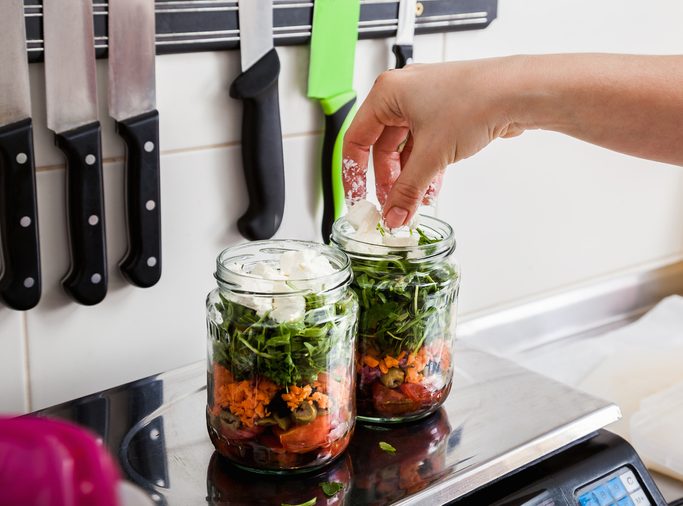
Slash calories
Eating fewer calories has been shown to increase longevity in multiple studies. The CALERIE (Comprehensive Assessment of Long-term Effects of Reducing Intake of Energy) study is the first human trial looking at this approach. The results, which were published in a special issue of The Journals of Gerontology, Series A: Biological Sciences and Medical Sciences, show that eating fewer calories (without becoming malnourished, of course) is tolerable and has positive effects on many markers of disease risk. In fact, the authors identified a slower pace of aging among the individuals in the caloric restriction group. Study participants were tasked with reducing their daily calorie intake by 25 percent compared to what they usually eat. “Caloric restriction has been shown to be effective in delaying aging in multiple species and the results in humans look equally promising,” says Biological Sciences Co-Editor-in-Chief Rozalyn M. Anderson, PhD, FGSA, who leads the Metabolism of Aging Research Program at the University of Wisconsin-Madison, in a news release. “Indeed for many studies, caloric restriction is used as the gold-standard for enhanced longevity against which new drugs and anti-aging strategies are measured.”

Run for your life
Runners live an average of three years longer than non-runners; remarkably, for every hour you run, you tack on about seven hours of additional life, according to an analysis of several large studies published in the journal Progress in Cardiovascular Diseases. The researchers suspect that the health benefits of running—particularly a stronger heart and lungs—may be to thank for the increased lifespan. Check out the 9 things that happen to your body when you start running.
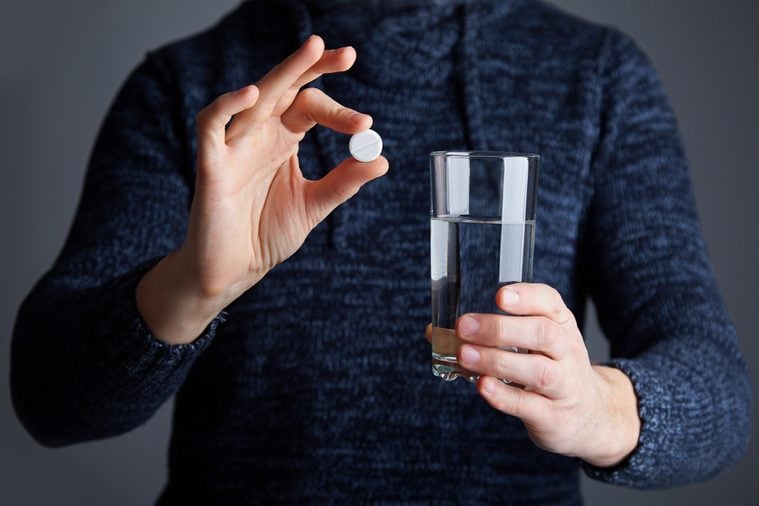
Talk to your doctor about aspirin
It could help, says Dr. Roizen. Taking baby aspirin daily can help stave off heart attacks and nine types of cancer, as long as your doctor gives you the all clear. For some people, including those who tend to bleed excessively, the risk of taking daily aspirin may outweigh the benefits.

Join Facebook
Having a Facebook page could actually add years, finds a new study published in the Proceedings of the National Academy of Sciences. The average Facebook user is about 12 percent less likely to die than someone who doesn’t use the social network. The researchers think the beneficial health effects of active online social ties are akin to those seen with face-to-face interactions.

Be OCD with your meds
Many of the medications you take to lower your risk for diseases—think of statins for high cholesterol or diuretics that lower your blood pressure—work best when you don’t miss a dose, Dr. Roizen says. “Many will cause a rebound effect if you miss a few doses.” For example, skipping your blood pressure pills for just a few days can result in even higher blood pressure levels than you had before you started treatment. Pill boxes with alarms can help you remember to take your meds; so can pairing your pills with something you do every day, such as brushing your teeth.

Join a book club
The benefits of participating in a book club may extend even further than the social aspects. It turns out that readers live longer than non-readers. Reading for at least 30 minutes a day extended participants’ lives for an average of two years, finds a study published in Social Science & Medicine. What’s more, book readers who reported reading for more than three hours every week were 23 percent less likely to die than their peers who only read magazines. Learn more about the health benefits of being a bookworm.
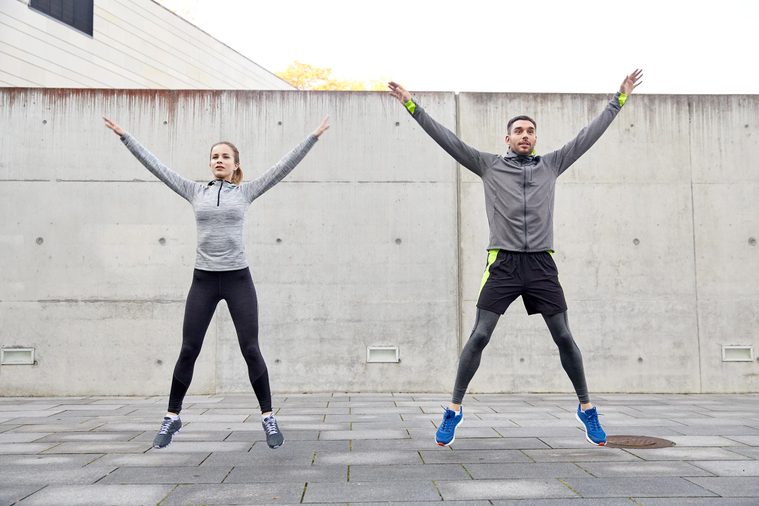
Jump for joy
“Forty jumps a day on a hard surface will strengthen your bones and spinal discs and decrease your risk of breaking a bone,” Dr. Roizen says. Older people who break a bone are at an increased risk of dying for up to ten years, and this holds for most fracture sites including the upper arm, spine, rib, pelvis, and hip, according to a new study in the Journal of Clinical Endocrinology & Metabolism. Here are other ways to slash your risk of developing the brittle bone disease osteoporosis as you age.

Give yourself a break
If you overindulge one night or skip your indoor cycling class to grab a drink with a friend, forgive yourself, Dr. Roizen says. “Don’t let one mistake totally derail you,” he says. “Pick things back up tomorrow.”
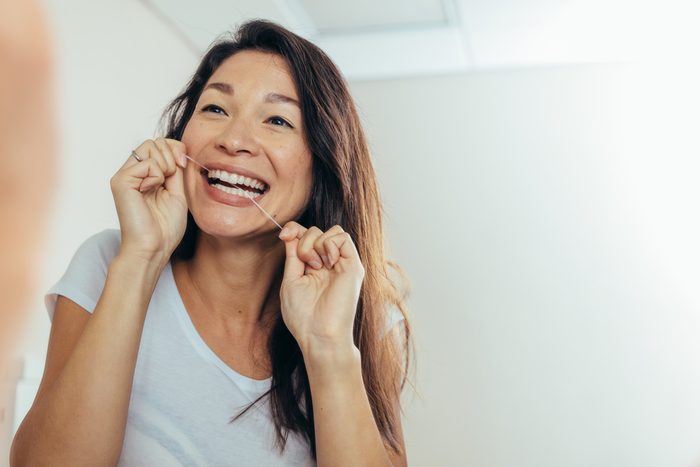
Don’t forget to floss
Preventing gum disease decreases inflammation, which is a major driver of cancer, heart disease, strokes, and many other life-threatening conditions. “Flossing your teeth every day is one of the cheapest and easiest ways to decrease the risk of stroke, heart attack, cancers, and infection,” Dr. Roizen says. In fact, this daily habit can make your RealAge 6.4 years younger than your actual one, he quantifies in RealAge: Are You as Young as You Can Be?
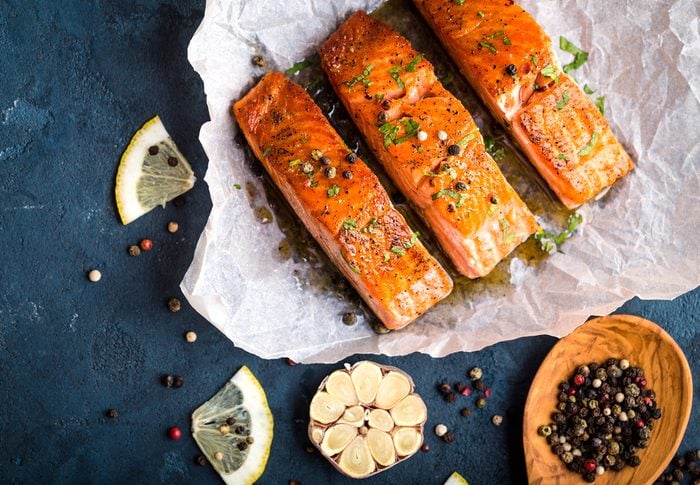
Don’t pigeonhole your foods
Just like you can eat breakfast for dinner, you can eat dinner for breakfast, Dr. Roizen says, “It’s fine to have a salmon filet or salmon burger for breakfast,” he says, pointing out that salmon is one of the healthiest foods out there.
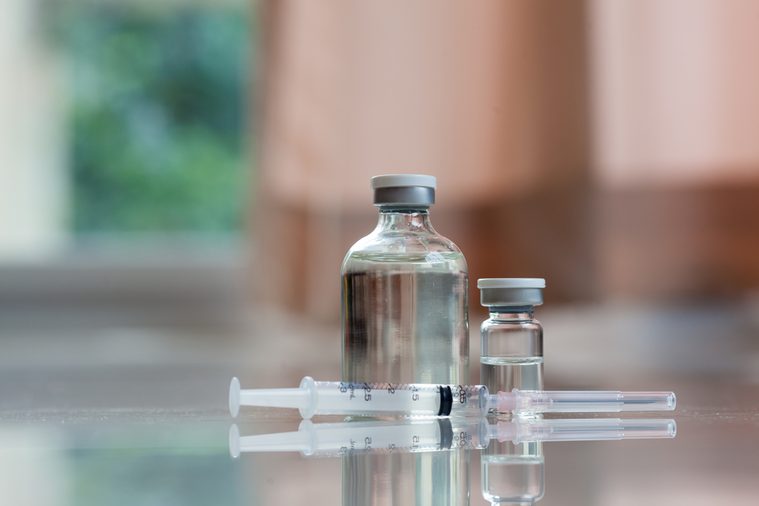
Stay up to date on shots
Immunizations aren’t just for kids. “Make sure you are up-to-date on all of your shots and immunizations,” Dr. Roizen advises. This is the best way to beef up your immune system so it is in tip-top shape to fight off infections. The federal Centers for Disease Control and Prevention lists the adult vaccination schedule to help you stay on top of all your shots. Find out the habits that are making you age faster.
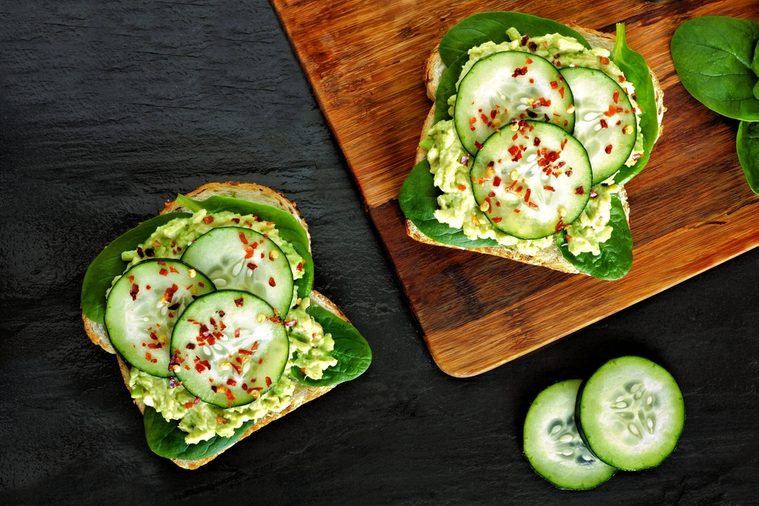
Eat more early and less later
Eating three-quarters of your total daily calories before 2 p.m. will keep your weight and health risks down. “This gives you more time to burn the calories and use them for fuel,” Dr. Roizen says. You could even try intermittent fasting.

Don’t text and drive
More than a quarter of all car crashes in 2014 involved cell phone use, according to the Department of Motor Vehicles. Texting while driving takes your eyes off the road and steering wheel and leads to distraction, all of which can set the stage for potentially fatal car crashes. Trying to send messages while you’re on the road actually puts you at an even higher risk for an accident than drinking and driving. It’s also illegal in most states, and the sanctions are severe. Don’t do it.

Eat only when the sun is out
If you only eat by day, there is good evidence that you will gain less weight and be healthier overall, Dr. Roizen says. This is one of the premises of his soon-to-be-released book What to Eat When. “Your body adjusts to food better if you eat in the day than the evening because it has time to burn it off and use the food for fuel,” he explains.
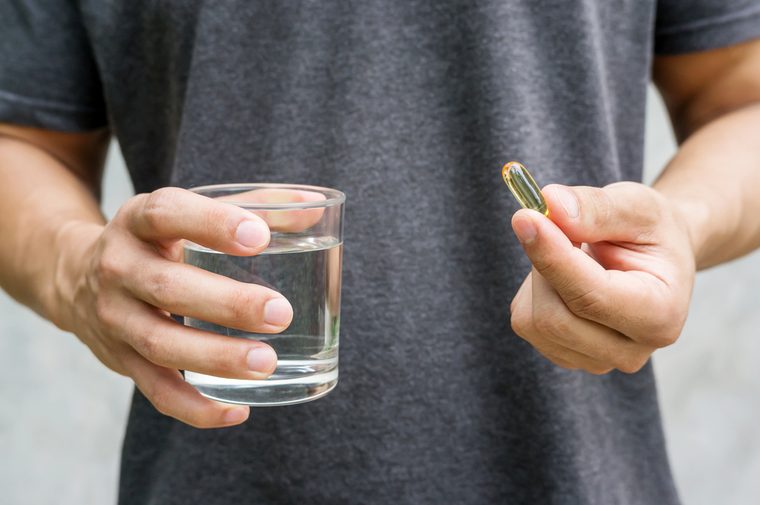
Get D Listed
Low levels of vitamin D have been linked to a laundry list of diseases and conditions. “The blood level to shoot for seems to be between 35 to 80 nanograms per milliliter (ng/mL),” Dr. Roizen says. “Get a blood test and see where you stand and supplement to reach a normal level,” he says. Try these 8 easy ways to get more vitamin D in your diet.
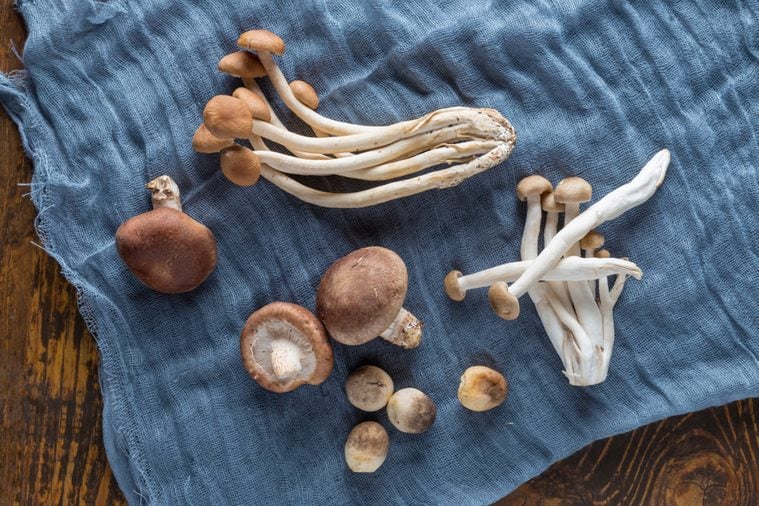
Let your mushrooms bask in the sun
Mushrooms have been called the new kale because of all the powerful vitamins and nutrients they contain, and now there’s a simple way to make these health benefits even more potent. “Mushrooms take in ultraviolet (UV) light, so if you turn yours upside down and place it in sun, the stalk will absorb UV light,” Dr. Roizen explains. Vitamin D is known as the sunshine vitamin because our bodies produce it when exposed to the sun’s UV light. Eating these UV-infused mushrooms can help us make more D, which is a good thing since millions of us are deficient in this important vitamin. Next, find out the reasons why you’ll age better than your parents.

